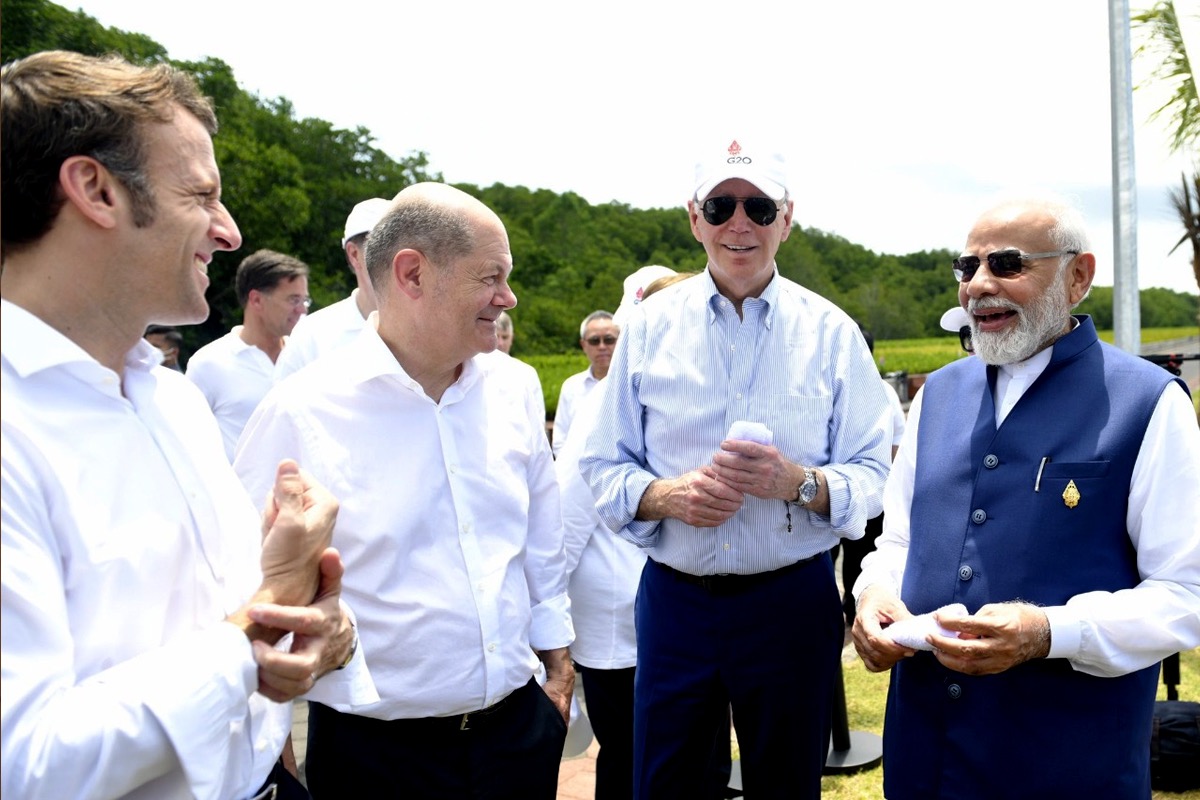The summit of Group of Twenty or G-20 ended in Bali on Wednesday with Indonesia handing over the presidency to India. Last day of the annual two-day summit was a packed day for Prime Minister Narendra Modi. He met several world leaders and held bilateral meetings with his counterparts from Singapore, Australia, Germany, Italy, UK, and France on the sidelines.
At the conclusion ceremony, where Indonesian President Joko Widodo handed over to him the ceremonial gravel, PM Modi invited world leaders to visit India for the G-20 Summit next year.
Bilateral meetings started with PM Modi meeting with his Singapore counterpart Lee Hsien Loong where they took note of the strong strategic partnership between India and Singapore and regular high level ministerial and institutional interactions. The two leaders also reiterated their commitment to further expand trade and investment linkages between the two countries particularly in Fintech, renewable energy, skill development, health and pharmaceutical sectors.
PM Modi invited Singapore to invest in various sectors in India including green economy, infrastructure, and digitalisation and to take advantage of its National Infrastructure Pipeline, Asset Monetisation Plan and the Gati Shakti Plan. Exchanging views on recent global and regional developments, both leaders reiterated their desire for working together for furthering the India-ASEAN multifaceted cooperation.
It continued with a working lunch with French President Emmanuel Macron who is likely to visit India in days to come. The two leaders reviewed ongoing collaboration in diverse areas like defence, civil nuclear, trade and investment. They also welcomed the deepening of cooperation in new areas of economic engagement between India and France. The discussions also focused on regional and global issues of mutual interest. Pictures of both leaders gave a message of cementing ties between the two countries.
PM Modi also met his German counterpart Chancellor Olaf Scholz, this being the third meeting between the two leaders this year. The leaders discussed a wide range of bilateral cooperation between India and Germany, which entered a new phase with the signing of the Partnership on Green and Sustainable Development by Prime Minister and the Chancellor during the 6th India-Germany Inter-Governmental Consultations. They agreed to deepen trade and investment ties and further increase cooperation in the areas of defence and security, migration and mobility, and infrastructure. Both leaders agreed to enhance cooperation and coordination in multilateral forums including G20 and the United Nations (UN).
Later, PM Modi also held a bilateral meeting with the first woman Prime Minister of Italy, Giorgia Meloni on the sidelines of the G20 Summit. He congratulated Meloni and discussed with her the deepening of bilateral cooperation in various sectors including trade and investment, counter-terrorism, and people-to-people ties. Their talks also focused on looking forward to celebrating the 75 years of India-Italy diplomatic relations.
“Excellent meeting with PM @GiorgiaMeloni. We exchanged views on how India and Italy can work closely in sectors like energy, defence, culture and in boosting climate change,” Modi tweeted.
He also met his Australian counterpart Anthony Albanese expressing satisfaction at the excellent state of relations between the two countries under the Comprehensive Strategic Partnership and the high-level interactions taking place on a regular basis between India and Australia.
They reviewed the progress made in deepening cooperation across a diverse range of sectors, including defence, trade, education, clean energy and people-to-people ties. Institutional partnership in the field of education, especially in higher education, vocational education, training and capacity building was discussed in detail. Importantly, both leaders also exchanged views on regional and global issues of mutual interest, which included their shared vision for a stable and peaceful Indo-Pacific Region, climate related matters and India’s G20 Presidency.
Last and important bilateral meeting was with UK PM Rishi Sunak — the first after he assumed office in last week of October. The two leaders expressed satisfaction at the state of the wide-ranging India-UK Comprehensive Strategic Partnership and progress on the Roadmap 2030 for Future Relations. They appreciated the importance of working together in bilateral and multilateral forums including G20 and the Commonwealth. Discussions touched upon important sectors of collaboration such as trade, mobility, defence and security. In one of the news conferences Sunak also stressed on point that he was also committed to a trade deal with India.
New Delhi will host G20 leaders for the summit on September 9 and 10 next year. Prime Minister Modi, at the closing session, told G20 leaders that India’s presidency will be “inclusive, ambitious, decisive, and action-oriented”, underlining environment, women-led development, peace and security, economic growth, technological innovation as priorities, which are embodied in the theme of India’s G20 chairmanship: “One Earth, One Family, One Future”.
PM Modi invited all G-20 world leaders for the summit next year. The G20 comprises 19 countries: Argentina, Australia, Brazil, Canada, China, France, Germany, India, Indonesia, Italy, Japan, South Korea, Mexico, Russia, Saudi Arabia, South Africa, Turkey, the UK, the USA and the European Union (EU).










